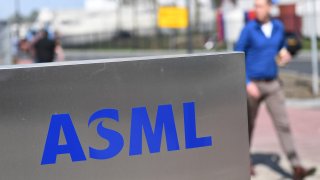
- ASML said second quarter net profit totaled 1.9 billion euros ($2.1 billion), marking a 37.6% year-on-year rise.
- The company also raised its outlook for 2023. ASML said it expects net sales this year to grow 30% year-on-year versus a prior estimate of 25% growth.
- The Dutch company makes expensive machines that are required in the manufacture of the world's most advanced chips but is also caught in the U.S.'s export restrictions on China.
ASML, one of the world's most important semiconductor equipment firm, posted a jump in revenue and profit in the second quarter, but warned of macroeconomic "uncertainties" ahead.
The Dutch company makes expensive machines that are required to manufacture the world's most advanced chips. It counts giants like TSMC, the world's biggest contract semiconductor maker, among its customers.
But ASML has also been caught in the middle of the U.S.-China technology battle because of the importance of the tools it makes.
Get DFW local news, weather forecasts and entertainment stories to your inbox. Sign up for NBC DFW newsletters.
Here's how ASML did in the second quarter versus Refinitiv estimates:
- Net sales: 6.9 billion euros ($7.7 billion), compared with 6.72 billion euros expected. That represents a 27% year-on-year rise.
- Net profit: 1.9 billion euros, versus 1.82 billion euros expected. That marks a 37.6% year-on-year increase.
ASML said it expects net sales in the third quarter of this year to sit between 6.5 billion euros and 7 billion euros.
Money Report
The company also raised its outlook for 2023, now anticipating its net sales this year to grow 30% year-on-year, up from a 25% growth estimate previously.
ASML said that the brighter outlook is due to strong revenue from its deep ultraviolet (DUV) lithography machine, which is used to manufacture memory chips. These go into various devices, from smartphones to laptops and servers, and could ultimately be used for artificial intelligence applications.
Still, ASML CEO Peter Wennink warned about macroeconomic uncertainties.
"Our customers across different market segments are currently more cautious due to continued macro-economic uncertainties, and therefore expect a later recovery of their markets. Also, the shape of the recovery slope is still unclear," Wennink said in a press release.
Companies that design and make chips that go into end products like smartphones have been dealing with high inventory levels of these components. That's because demand for end products, such as consumer electronics, continues to remain weak.
That means chipmakers are slowing down their output of chips and therefore using ASML tools less, Wennink said in pre-recorded video interview on the company website.
No 'significant impact' from China export controls
ASML has been caught up in the U.S. push to cut China off from key technologies, including those involved in the manufacture of advanced semicondcutors.
Last October, the U.S. introduced sweeping export restrictions on certain technologies to China, which Washington fears could be used in military or artificial intelligence applications. The Biden administration has been pressuring allied countries to follow suit with similar restrictions.
In June, the Netherlands — where ASML is headquartered — introduced its own export restrictions on advanced semiconductor equipment. Companies will require a license from the government to export certain technologies.
At the time, ASML said that these rules likely applied to certain DUV machines that the company sells.
While the Dutch government introduced them in June, they were first floated in March and were "not a major surprise" to Wennink.
"All in all, when you look at export control measures in total, we don't expect a significant impact on our 2023 year," but also on the longer term outlook, Wennink added.
The CEO said ASML is waiting to see if there are any further restrictions from the U.S., amid reports that Washington is looking at additional controls on technology exports to China.






